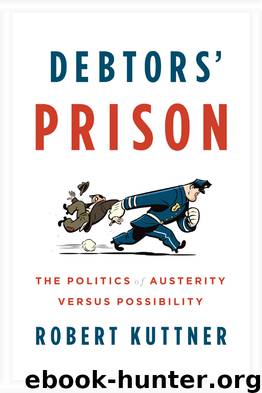Debtors' Prison by Robert Kuttner

Author:Robert Kuttner [Kuttner, Robert]
Language: eng
Format: epub
ISBN: 978-0-307-95981-2
Publisher: Knopf Doubleday Publishing Group
Published: 2013-04-29T16:00:00+00:00
PART THREE
Chapter 7
The Moral Economy of Debt
BY NOW, SEVERAL CONCLUSIONS SHOULD be evident. Reckless indebtedness leads to crisis. More often than not, the culprit is debt that results from the cycle of financial speculation and crash. After a crisis, debt relief is necessary for economic recovery. Avoiding moral hazard is a proper issue for averting the next crisis. Prevention of disabling debt is better achieved by adequate regulation of credit before the fact than by erecting prisons for the casualties of the last crisis. Intelligent people seem to have a very hard time grasping that paradox.
One reason for this myopia is that the pragmatic question of debt relief after a crisis is complicated by relations of power and privilege. Debt, as we have seen, is not just a means of financing investments or addressing public needs; it is part of a system for maintaining social relations or geopolitical advantage. In the collapse that began in 2007, the most toxic forms of debt were those incurred or promoted by banks. Banks, nonetheless, have retained the power to block debt relief for others. So have powerful nations. Today, entire economies are enlisted in the service of repaying old debts, even though debt relief would be far more efficient and far more socially just.
As we saw in the story of Daniel Defoe and the invention of modern bankruptcy, debt relief has been replete with double standards since its inception. Intermittent acts of mercy, case by case, were a poor substitute for national macroeconomic policies. As late as the nineteenth century, nations did not have the institutions or insights of modern economics. The banking system was badly regulated and chaotic. Only Britain had a central bank, and its bias was deflationary. Demands for respite from depression in the form of cheaper credit or bankruptcy reform were ad hoc and episodic. There was no coherent conversation about what today would be called countercyclical policy to temper the tendency of markets to overshoot on either the upside or the downside.
In the twenty-first century, governments have a modern arsenal of economic management institutions: central banks, instruments of fiscal and monetary policy, and highly refined tools of financial regulation and bankruptcy law. But they keep repeating the mistakes of the nineteenth century. What has not evolved with the institutions is the distribution of political power. If anything, financial elites enjoy far more concentrated influence than at any time since the Gilded Age. Thus the policy mistakes are not errors of judgment but the natural products of a lopsided politics.
Download
This site does not store any files on its server. We only index and link to content provided by other sites. Please contact the content providers to delete copyright contents if any and email us, we'll remove relevant links or contents immediately.
The Secret History by Donna Tartt(19088)
The Social Justice Warrior Handbook by Lisa De Pasquale(12190)
Thirteen Reasons Why by Jay Asher(8909)
This Is How You Lose Her by Junot Diaz(6886)
Weapons of Math Destruction by Cathy O'Neil(6279)
Zero to One by Peter Thiel(5801)
Beartown by Fredrik Backman(5754)
The Myth of the Strong Leader by Archie Brown(5507)
The Fire Next Time by James Baldwin(5444)
How Democracies Die by Steven Levitsky & Daniel Ziblatt(5218)
Promise Me, Dad by Joe Biden(5153)
Stone's Rules by Roger Stone(5087)
A Higher Loyalty: Truth, Lies, and Leadership by James Comey(4962)
100 Deadly Skills by Clint Emerson(4925)
Rise and Kill First by Ronen Bergman(4788)
Secrecy World by Jake Bernstein(4753)
The David Icke Guide to the Global Conspiracy (and how to end it) by David Icke(4717)
The Farm by Tom Rob Smith(4509)
The Doomsday Machine by Daniel Ellsberg(4490)
